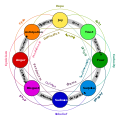Concept
The Four cornerstone model was developed by Ayman Sawaf and Robert Cooper in 1997. [5] [7] Multiple studies and research carried out in regards to emotional intelligence based on this model revealed a marginal qualitative difference between the public and private sector executives and expand on the usage of this model. [7] The concept focuses on the fact that creative involvement in a stimulating job, opportunity, or an exciting discussion results in an increase in alertness, emotional energy, and performance. Repetitive and boring tasks on the other hand put the performer in danger of dismay, lack of efficiency and making mistakes. This generates its explanation from the fact that professionalism is based on self-discipline, inner guidance and emotional drive. [5] [8]
This page is based on this
Wikipedia article Text is available under the
CC BY-SA 4.0 license; additional terms may apply.
Images, videos and audio are available under their respective licenses.

